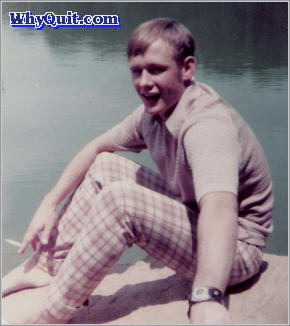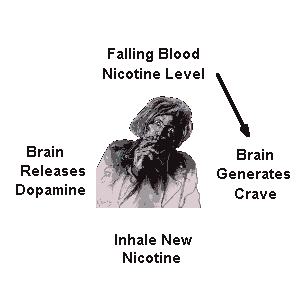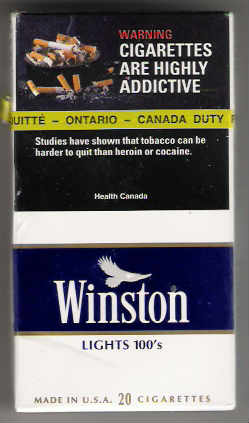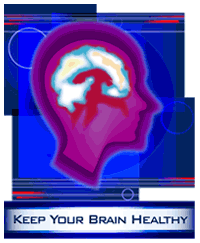
Confessions of a teenage nicotine addict
I'd spent years trying to get Mom to quit smoking. But somehow that wasn't important right now. Kimberly was all that mattered. There she was, sitting in the dugout of our neighborhood baseball field, smoking, with a pack of cigarettes beside her. She was fifteen, beautiful, and I yearned to know her better.
 Just five bummed cigarettes and three days later, I was alone in my room with no Kimberly to impress and my brain commanded me to find and smoke another. I had already become a hypocrite, and I was about to become a thief, beggar and liar.
Just five bummed cigarettes and three days later, I was alone in my room with no Kimberly to impress and my brain commanded me to find and smoke another. I had already become a hypocrite, and I was about to become a thief, beggar and liar.
Apparently, getting hooked so fast isn't unusual. According to a study published in the July 2007 edition of Archives of Pediatric and Adolescent Medicine, ten percent of youth smokers begin to experience symptoms of addiction after smoking just two cigarettes.
I knew Mom kept a carton of cigarettes in the freezer. I recall standing there staring at them, as my conscious and compulsive brains fought over what to do next.
A few external chemical molecules -- such as nicotine -- are so close in shape and size to natural brain chemicals, that once in the brain they permanently enslave its dopamine reward pathway. This brain circuitry normally helps set priorities by making humans pay attention to activities that keep us safe, alive and learning. It generates the mind's most durable memories, memories that should be associated with basic survival needs such as accomplishment, bonding, acceptance, nurturing, nutrition, hydration and reproduction. Instead, this powerful circuitry becomes dedicated to drug seeking and use.
Standing in front of the freezer that day, my compulsive brain prevailed and its victory produced a thief, willing to steal to feed what had now become an endless chemical need. But I wasn't just stealing nicotine from Mom. I was using it to steal nerve communication chemicals from my brain.
 Some experts contend that nicotine, with its alert high, is the most perfectly designed drug of addiction. Not only does it cause our dopamine pathways to generate a powerful "aaah" sensation, it inhibits normal dopamine cleanup, allowing released dopamine to linger between brain neurons far longer than normal.
Some experts contend that nicotine, with its alert high, is the most perfectly designed drug of addiction. Not only does it cause our dopamine pathways to generate a powerful "aaah" sensation, it inhibits normal dopamine cleanup, allowing released dopamine to linger between brain neurons far longer than normal.
About 90% of regular nicotine users at some point discover that they now have a new #1 priority in life: servicing that next mandatory nicotine feeding. But dependency comes with a second hook: tolerance.
Tolerance means that, over time, the drug user needs more of the drug to get the same effect. In a process known as up-regulation, the brain grows millions of extra nicotinic-type acetylcholine receptors in at least eleven different regions of the brain. Tolerance means that any attempt to stop using the drug will leave the addict temporarily de-sensitized to normal neuro-chemical flow, because the brain needs time to down-regulate (work off those extra nicotine-hungry receptors) and restore natural sensitivities.
"Give it time" may sound easy, but the deep inner, compulsive primitive mind controls the body's anxiety alarm circuitry, those pathways that order fight or flight. If not calmed and/or re-schooled, the "lizard brain" may view quitting smoking as akin to attempting to starve yourself to death, setting off powerful anxiety alarms, impossible to ignore.
 Clearly I didn't understand the science of addiction when that first fateful puff caused a massive bolus of nicotine to arrive 8 to 10 seconds later and produce a dopamine explosion inside my brain. I had absolutely no warning that smoking nicotine was as addictive as heroin or cocaine, as Canada's cigarette pack warning label has taught Canadian students since 2000.
Clearly I didn't understand the science of addiction when that first fateful puff caused a massive bolus of nicotine to arrive 8 to 10 seconds later and produce a dopamine explosion inside my brain. I had absolutely no warning that smoking nicotine was as addictive as heroin or cocaine, as Canada's cigarette pack warning label has taught Canadian students since 2000.
But I knew it was a bad idea. And watching Mom fill ashtray after ashtray while coughing her head off, I at least knew it was difficult to quit.
I also knew a couple of the basic health warnings, at least in regard to cancer. But I would soon discover that engaging in prolonged vigorous physical activity was extremely challenging, if not impossible, depending upon the amount of carbon monoxide then circulating inside my bloodstream.
Yet here I was, a smoker. I found myself in a state of "cognitive dissonance." It's a fancy psychological term that describes the uncomfortable tension that results from having two conflicting thoughts at the same time, or in engaging in behavior contrary to your core beliefs.
So how did I rationalize and explain away the fact that I was now a full-fledged smoker when I didn't want to be, yet found myself continuing to do so, day after day after day after day?
I'd been extremely hard on Mom for not quitting. How could I now look in the mirror and not see a total hypocrite looking back? How could I live with the thief and liar I would now become?
Chemical addiction quickly forced me to lie about why I needed to leave the house, family or classroom, and why I was covered in a horrible smell when I returned; I had to find a way to get that next nicotine fix. It compelled me to spend more and more time with other young nicotine addicts, to smoke in the school parking lot and bathroom, to resort to begging for cigarettes, and from time to time actually stealing them from Mom. What pack of lies could hide the thief, beggar and liar I'd become?
Like the daily chore of taking out the trash, I now had to find a way to service my brain's rapidly increasing tolerance to nicotine, and replenish a blood-serum nicotine level that was constantly falling by 50% every 120 minutes. I quickly found myself smoking half-a-pack a day, and needing to smoke nicotine before, during and immediately after school. During class I often found myself sitting at my desk thinking about needing to smoke instead of the lesson being taught.
It is ironic that I smoked nicotine to gain acceptance by Kimberly and once hooked solid, she was gone and I was unacceptable to most of the world. How many people want their best friend to be a "real" drug addict? Who wants to date, fall in love with, marry or hire a person who interrupts life 10, 20, 30 or more times every day to light a fire between their lips, and then inhale a burning mini toxic waste dump of destructive chemicals into their body?
Imagine a child never knowing their parent's natural smell but instead bonding to and being forced to touch the hundreds of toxins deposited upon their face, hair, hands and clothing. Imagine living a hyprocrite's life, in teaching our children not to do what, all day long, we force them to watch us do. Imagine an extremely destructive higher priority cheating them of our time, attention, health, and 13 to 14 years of our life.
I spent the next thirty years struggling to break free and each time falling flat on my face. Over the years I tried every new quitting product that arrived. The commercials always made them sound like quitting with them was easy but nothing could be further from the truth. In fact 93 out of 100 using the nicotine gum or patch to try to quit will fail and relapse to smoking within six months.
By age 20 I was smoking nicotine at least 20 times a day, by age 30 my brain demanded 40 daily nicotine fixes, and by age 40 I was inhaling nicotine every 15 minutes or so, about 60 times a day. By then, there was no part of my mind, body, life or soul unaffected by the 4,000 hot chemicals arriving with each and every puff.
I repeatedly discovered that attempting to endure nicotine withdrawal in ignorance and darkness, without education or support can be a frightening experience. Imagine significant panic, anxiety, anger and depression, all seeming to happen at once. Imagine enduring up to 72 hours of nicotine withdrawal before getting all nicotine out of your system and starting to gradually, over time, feel a little bit better.
My health began to fail. I developed chronic bronchitis, recurrent pneumonia, early emphysema and, at three packs-a-day, there wasn't enough oxygen in my bloodstream to keep my teeth alive. After one last failed attempt I swore I'd never try quitting again. I fully accepted my fate. I was a true drug addict, in every sense, and like half of all adult smokers, I would die an addict's death.
And then it happened. Acceptance of the simple truth that I was a failed drug addict freed me from the mountain of lies I'd fed my mind as to why I smoked. It allowed me to no longer be afraid, or run and hide any time smoking or quitting was mentioned. Although still chemically captive, I was somehow now free to listen and learn.
No longer living behind a thick wall of denial, I actually grew curious about my master. I still don't know why but one day I typed "quit smoking" into an Internet search engine and was shocked to discover an entire world of information that I'd previously refused to see. I stumbled upon an Internet quit smoking support group. I told them I'd given up on quitting. They reached through the screen and swamped me in hope. I cried. Two days later I joined them, and have remained nicotine-free since.
I discovered that the lies I'd told myself were some of the most harmful of all. Flavor, taste? There are zero taste buds inside these lungs. Like or love? It wasn't that I liked smoking but that I didn't like what happened when I didn't smoke - the onset of withdrawal. Relaxation? Nicotine is a central nervous system stimulant that made my heart pound 10 to 20 beats per minute faster.
There is zero pride in revealing how drug addiction fostered changes in my character, beliefs, values, and health. I don't want you to know that by the time I turned 45 that four of my teeth had already died. It's much easier to allow folks to believe that smoking was my only problem or that I remained the same person: a predominately wholesome and mom-loving kid. But truth is, I became a teenage drug addict, compelled to lie, beg, and steal, and to associate with those who understood my need to do so.
 On May 15, 1999, I was at last able to arrest by chemical dependency upon nicotine. I have now been free and healing for 8 years, 2 months and 2 days. But I have not killed my addiction, only arrested it. The key to the cell and trading places is just one powerful puff of what may be earth's most captivating chemical.
On May 15, 1999, I was at last able to arrest by chemical dependency upon nicotine. I have now been free and healing for 8 years, 2 months and 2 days. But I have not killed my addiction, only arrested it. The key to the cell and trading places is just one powerful puff of what may be earth's most captivating chemical.
Nicotine dependency recovery opened my mind to the fact that I'd lived a pack of lies. Quitting exposed those lies to truth. I quickly realized that nicotine didn't give me my spark or edge. That life without it grows better not worse. All the things I once did as a smoker could now be done as well as or better without smoking.
Recovery's rewards are far more than just quitting. It's a journey of readjustment where, one-by-one, we reclaim all the pieces of life. It's a homecoming that turns back a motivational clock, and may involve an awakening as to how smoked nicotine totally infected a life, while eating away a brain, lungs and bloodstreams. I never thought I'd be able to say this, but I now like the guy in the mirror. The need for lies is gone. I'm home, and who I always wanted to be. Just me and free.

